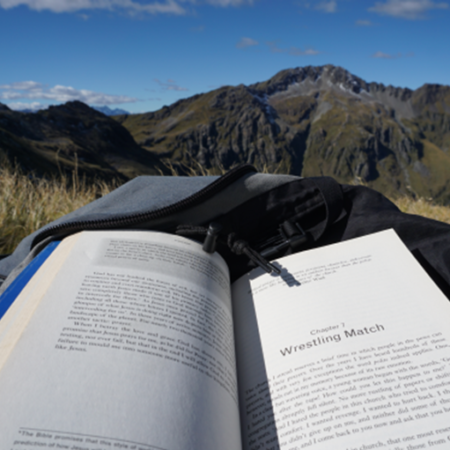Last week I was on my retreat, the first I’ve been on since my ordination. Clergy are encouraged to go on one retreat a year, so I took opportunity of going away during a week when I did not have any rest home service or other urgent commitments. The time proved to be right: I encountered glorious weather in the mountains above Lewis Pass.
The first two days were sunny with hardly any cloud and practically no wind. I made my way to a small hut among mountain tarns, about 1350m above sea level. No tracks or trails lead to the hut. It can be accessed by walking along mountain ridges and sidling along slopes. Now and then faint traces of trails appear — hunters and trampers regularly traverse these tops. The hut has two bunk beds and is tall enough to stand erect. From the time I left the highway until I returned to my car I did not see another human being.
I did see a few birds, and a few rabbits. But the animals that made their presence known the most were the frogs in the tarns. I didn’t see them, but I heard them clearly in the evening. Because there was hardly any other sound (no wind!) I went to sleep to the croaking of the frogs.
On the second day I leisurely walked along steep ridges to a peak, stopping often along the tops to read. After all, I was not only here for physical exercise, but also to pray, reflect and read. I was assigned the book “Prayer” by Philip Yancey. I didn’t really come across anything new, but it brought prayer and our relationship with God into focus again. Yancey also addressed the common phrase “Prayer does not change God, but it changes him who prays”. As Yancey outlined and any good Biblical scholar could explain, the first part of that phrase goes against the Bible’s clear testimony. God does change, because he is unchangeable: God is loving and merciful and therefore does respond to prayer. After all, we believe in the relational God revealed in the Bible, not the static god of Greek philosophy. Philip Yancey quotes George MacDonald: “A God that should fail to hear, receive, attend to one single prayer, the feeblest or worst, I cannot believe in; but a God that would grant every request of every man or every company of men, would be an evil God—that is no God, but a demon.” Nevertheless, Philip Yancey clearly says that those who pray are changed even more. And that’s the more important role of prayer—our relationship with God, when we come into God’s presence by pouring our heart out to God, whether in formal or more intimate words.
After the quiet of the mountains it was hard to return to the madness of human busyness.
Already on the road drivers were taking extraordinary risks in passing others. When I went to buy pizza, another car roared past me to take the just vacated car park. The rush and noise inside the pizza outlet was overwhelming. At home even my own voice felt loud. I’ve again gotten used to the noise and rush, but I will treasure the stillness of the mountains.

